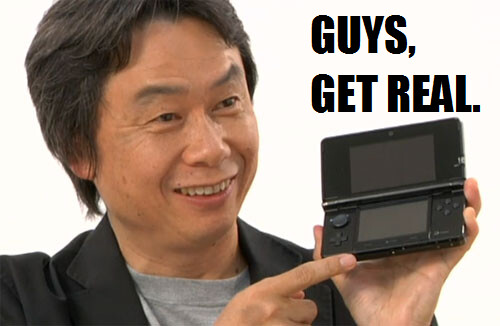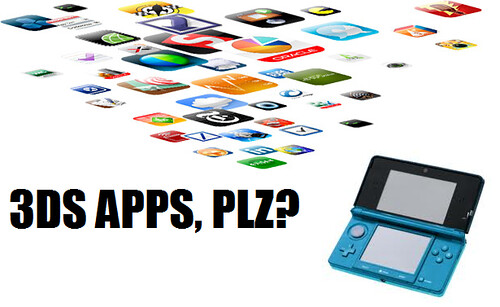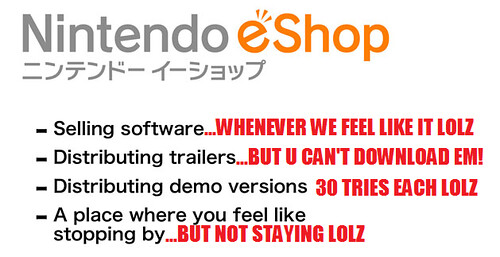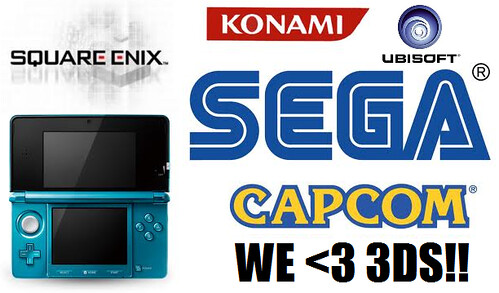With 2011 shaping up to be a solid start for
the Nintendo 3DS (and the first quarter of 2012
showing more success) it would be easy to feel
pretty confident about Nintendo’s latest
handheld. After all, following the big price
drop, hardware sales in North America exploded
past the first-year mark set by the original DS.
As a 3DS owner and general Nintendo fan, I am no
doubt happy with my purchase – and I feel like
there are more than enough reasons for others to
feel the same.

Regardless, I think it would also be foolish
to believe the 3DS is “in the clear” at this
point. I want to set the tone for this editorial
by saying something I never thought I would:
Nintendo needs to very seriously start
considering ways to tackle this whole issue of
“mobile gaming versus handheld gaming”. As much
as I respect Nintendo (particularly its
handhelds), this is a battle that increasingly
seems impossible to win unless the company steps
up its game and “gets real” about a few
different things.
Here is the thing: I think Nintendo
already has the means to do this.
Furthermore, I think the 3DS is the perfect
platform to begin the process of adapting to
various elements of the mobile gaming
experience. Again, I never want to
lose the kind of handheld gaming experiences
that I’ve known and loved for years, but in
order to stay on top of the competition, I think
Nintendo should really consider the following:
1. Our Top Priority Should Be The App
Market.

This should seem like the most obvious bullet point for Nintendo to address: creating and supporting an “App market” similar to what iOS and Android devices have to offer. Obviously, an App Market for the 3DS means that Nintendo would need to develop more app-style software, or integrate third-party development. The former is more of a possiblity than the latter, given Nintendo’s past with the creation of third-party or otherwise unofficial software. With that in mind, I think the company needs to completely re-vamp its current “app software” (such as the various over-priced memo pads, calculators, and calendar apps) and focus on providing more of what consumers can quickly use and enjoy on their iOS/Android devices. Think of something as simple as a basic flashlight application; there is no reason to think the 3DS cannot feature something like that. While the 3DS would likely never replace the common use of those other devices, boasting the same (or similar) app-like software seems like an issue that Nintendo should have anticipated years ago, when the iPhone was starting to take off.
2. We Need The eShop To Expand.

The eShop has been a major step forward in Nintendo’s attempt to embrace online gaming, but the marketplace, the content, and the interface could all use a lot of work. The service has only been around for about 9 months, and there are actually a few gems to find (such as Mutant Mudds), but I still think Nintendo has the wrong idea – at least when it comes to approaching the “mobile gaming” market. Instead of being the 3DS’s answer to Xbox Live Arcade or PlayStation Network, why not offer more of the “smaller” games offered on mobile devices? For instance, why not charge consumers $3 or $5 for a bite-sized game that somehow takes advantage of the 3DS hardware and its capabilities? Finally, the eShop needs to be easier to navigate, plain and simple – it is just too confusing, and too cumbersome to search through. Since new videos and other downloads are already grouped with the titles you search for, it should be easier to come up with a list of what is available for whatever you want.
3. We Must Maintain Our Support.

The biggest problem Nintendo seems to face with each of its consoles – not just handhelds, by any stretch – is maintaining its third-party support, and balancing its own first-party content. The Big N never seems to get this right, and part of it has to do with its unique approach and determination to innovate. Perhaps that is giving too much credit to Nintendo – sometimes, it seems that the third-party teams simply cannot utilize many of the specific functions of each Nintendo console, and I would be surprised if they caught on with the 3DS any faster. So far, the implementation of 3D effects has been hit or miss, with most of the best 3D experiences coming from first-party games like Starfox 64 3D, Super Mario 3D Land, and Mario Kart 7. Nintendo needs to continue to encourage third-party developers to innovate with their 3DS content, delivering experiences that simply cannot be enjoyed elsewhere. This is the only way that the special perks of the 3DS will continue to be enjoyed by the masses in the future.
4. We Need To Get With The Times.

Nintendo, possibly more than any other company in the gaming industry, always seems to be stuck somewhere a decade or two in the past. The final point in this editorial is perhaps the most important; Nintendo simply needs to “get with it” and address the state of the market, rather than playing off its competition. I understand that confidence is crucial in the business world, and standing by your product is important to investors, but how are you going to keep any of that support if you lose sight of what is really happening? This appears to be the case, as Nintendo slowly warms up to online gaming while continuing to shoot down popular byproducts of the current-gen consoles, such as Achievements, Trophies, DLC, and indie software. Finally, Nintendo needs to quit making moves such as not publishing The Binding of Isaac on the eShop for being “too offensive”. If a top-notch team such as the creators of Super Meat Boy are interested in supporting your handheld, you don’t shoot them down for something as backward as “being too offensive”. As the gaming industry is constantly growing and trying to “mature”, begging to be recognized as a valid art form, moves like this are what set us back a few decades and make us all seem like a bunch of squares. It’s no different than how I felt about Duke Nukem Forever – the sense of “humor” was terrible, and in the end, I thought the final product was downright offensive to the audience – so immature, so lacking of any substance or justification for all those years of delays. That being said, even if I personally don’t support the idea of tying a bunch of offensive material into video games, I think the freedom of expression is crucial to recognize as a part of any new project.
